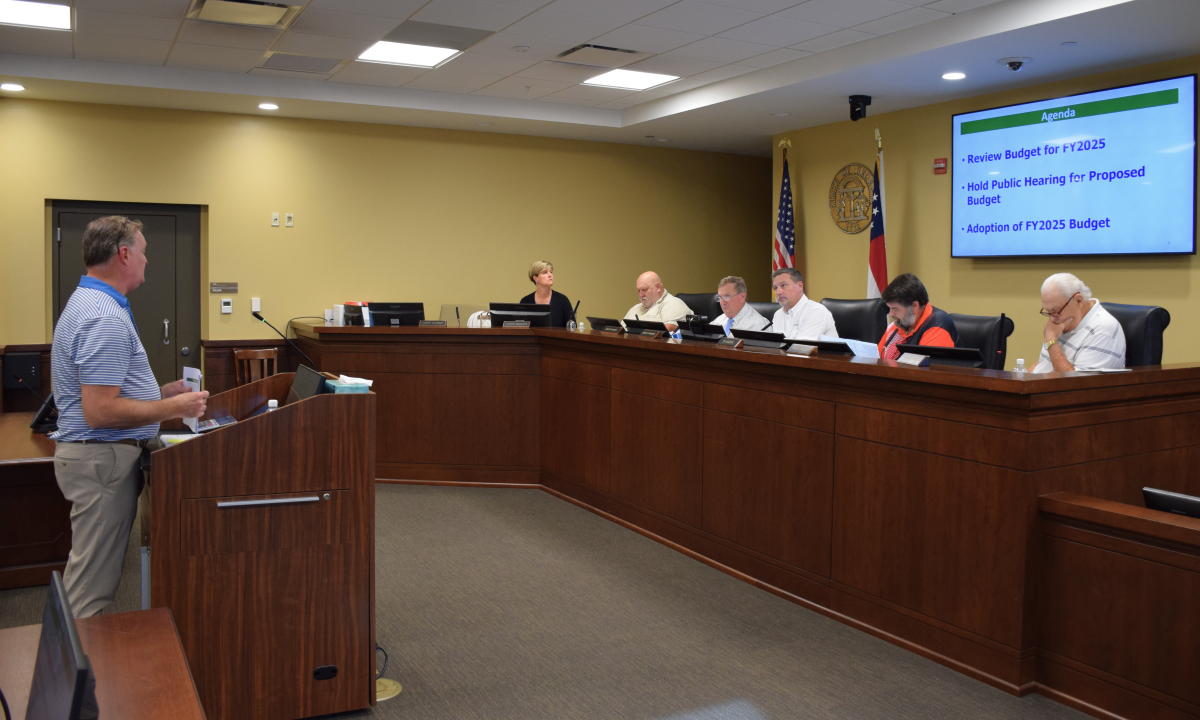Despite a new lineup of legislators – as well as a new governor and lieutenant governor — many health care issues in the upcoming session of the Georgia General Assembly will have a familiar look. They are largely the same ones that have percolated under the Gold Dome in past years.
Health care regulations. Surprise medical billing. Rural health care. Medical marijuana.
Yet something new just got created that may serve as a vehicle for legislation to shake up Georgia health care.
House Speaker David Ralston (R-Blue Ridge) has named a special committee on Access to Quality Health Care. While it will focus on regulations under the controversial certificate-of-need (CON) laws, the panel may also look at state proposals to shore up or expand health insurance.
Ralston said Thursday that he hopes the committee “will make a lot of progress this session,’’ which convenes next week. He also spoke to reporters about several other health care-related issues during a media briefing at the state Capitol.

The special committee will be chaired by two people very familiar with health care. State Rep. Richard Smith (R-Columbus), chairman of the House Insurance Committee, will chair the special panel, while Rep. Sharon Cooper, head of the House Health and Human Services Committee, will serve as vice chair.
It’s a two-year gig for the committee members, whose numbers include some Democrats.
Certificate of need, in particular, appears to be in legislators’ crosshairs, after years of wrangling over even the slightest changes to these state regulations.
The CON process governs the construction and expansion of health care facilities and services in the state. It’s a very powerful factor in the state’s health care industry, and supporters of projects that don’t get CON approval often complain that the process is unfair.
“It’s time that we drill down and let Georgians know what the issue is about, and let’s resolve it,’’ said Ralston.
That committee’s work won’t be the only thing for the health care industry to watch. Hundreds of bills every year touch on health care, and there are always some wild cards that turn up.
Here are some topics seen as likely to surface during the session:
Certificate of Need
Two legislative committees have proposed major changes to the way Georgia regulates hospitals and other medical facilities.
A Senate study committee, chaired by state Sen. Ben Watson (R-Savannah), a physician, has formulated draft legislation that could ease state restrictions involving Cancer Treatment Centers of America, which has a hospital in Newnan, and clear a path for a planned sports medicine center in Alpharetta.
 The goal, he said recently, is deregulation – to inject more competition into health care services.
The goal, he said recently, is deregulation – to inject more competition into health care services.
A House panel in December backed more sweeping changes, including recommending replacing CON with an accreditation and “rigorous licensing system’’ for health care providers.
The House Rural Development Council also seeks to require nonprofit hospitals to disclose financial information on their websites, including their IRS 990 forms and executive salaries, as well as their community benefit spending, terms of their debt, and properties owned, including those that are vacant.
Ralston said Thursday that the Rural Development Council members are concerned about what some nonprofit hospitals are doing with their financial reserves – and about how much reserves they have. He said he supports increasing hospital accountability and transparency with regard to these holdings.
Almost any proposal to change CON, though, would draw opposition from influential hospital organizations, who have long supported the current system.
Waiver Proposals
The new committee could also consider requests for insurance changes that take the form of “waivers,’’ federally approved exceptions to states’ existing health programs.
A waiver plan getting renewed attention since the November election was developed by Atlanta-based Grady Health System three years ago.

The Grady plan would use federal matching Medicaid dollars to help set up pilot sites that could provide coverage to thousands of people who currently lack medical insurance. Participating medical providers would then manage these patients’ care.
“We hope to see coverage expansion to low-income Georgians,’’ Laura Colbert of Georgians for a Healthy Future, said Thursday at an event sponsored by the consumer group. “We’re feeling optimistic’’ about a statewide program to increase health insurance, she said.
But Colbert added, “My fear is that the conversation about CON will dominate the health conversation in a way that will prevent the Legislature from focusing on consumer issues that are more pressing.”
Georgia has one of the highest uninsured rates in the nation. Its political leadership has rejected expanding the state Medicaid program, citing the expense of that move. It’s one of only 14 states that have not adopted expansion as outlined by the Affordable Care Act.
Another waiver idea being discussed pertains to the state’s health insurance exchange and “reinsurance.″ A reinsurance program aims to stabilize health insurance premiums in the exchange by capping the cost that insurers incur in covering people with high medical costs.
Ralston noted that Gov.-elect Brian Kemp has mentioned waivers as an area he would like to pursue. “I anticipate we’ll know more about that’’ after Kemp’s State of the State address, Ralston said.
Surprise Billing
This thorny issue continues to elude compromise.
Surprise billing occurs when consumers have procedures or visit ERs at hospitals in their insurance network, then get separate bills for hundreds or even thousands of dollars from non-network doctors who were involved in their care.
 Such bills from ER doctors, anesthesiologists and radiologists, among others, often baffle and anger consumers.
Such bills from ER doctors, anesthesiologists and radiologists, among others, often baffle and anger consumers.
The most recent legislative attempt to fix the problem was last year, but it stalled like those in previous years, because lawmakers could not reach a compromise between differing proposals.
One proposal, backed by health insurers, focused on giving consumers more information on non-network providers and costs. The other, supported by physician groups, would have set a formula for insurer reimbursements to doctors for out-of-network care.
The issue still resonates at the Gold Dome. State Sen. Chuck Hufstetler, a Rome Republican who backed legislation earlier this year, told GHN this week, “We will try again to find common ground between the House and Senate as well as insurance companies and [medical] providers.’’
Tobacco Tax
Hufstetler also told the Rome News-Tribune that he supports legislation similar to a bill introduced by Republican Rep. Ron Stephens of Savannah, near the end of last year’s session. It would have raised the tax on a pack of cigarettes from 37 cents to $1.87.
Tobacco use –– the single most preventable cause of disease, disability, and death in the U.S. –– causes more than 11,000 deaths in the state annually, and its direct health care costs amount to more than $3 billion a year.

The American Lung Association says an increase in the levy would deter many youths from smoking by making tobacco more expensive, And Georgia could raise more than $400 million a year to make investments for the health and well-being of Georgia residents by raising the cigarette tax by at least $1 per pack, says the Georgia Budget and Policy Institute.
Georgia has the third-lowest state cigarette tax rate out of the 50 states and the District of Columbia. But many libertarians and conservatives oppose any tax increases.
Speaker Ralston, when asked about a possible tax hike, noted that adult smoking rates have declined in the U.S. “I’m always hesitant to suggest raising taxes in any event,‘’ including for tobacco use, he added.
Medical Cannabis
Georgia allows people with medical conditions to possess medical marijuana. But it’s illegal to bring it into the state.
A legislative commission has recommended allowing medical marijuana to be grown in Georgia and sold to patients. The proposal would license marijuana growers, manufacturers and dispensaries.

Georgia is one of the few states where medical marijuana is legal but cultivation and distribution are not, the Macon Telegraph reported. That means the 6,421 Georgia residents with medical cards have virtually no legal way to get the medication they need.
“We really have set up a law that is potentially forcing Georgia citizens to break federal law in order to obtain the product,” state Rep. Allen Peake, a Macon Republican who spearheaded the 2015 medical marijuana legislation, told the Telegraph.
State Sen. Matt Brass, a co-chairman of the commission, said he wants to help patients who can benefit from medical marijuana without moving the state closer to legalization of marijuana for recreational use, the AJC reported recently.
“I know this bill will not make everyone happy,” said Brass, a Republican from Newnan. “We’re simply doing this to get access for our patients.”
Rural Health Care
In recent years, Georgia lawmakers have tried to address the financial struggles that many rural hospitals face. Legislation to help these facilities included raising the rural tax credit for donors to rural hospitals from 90 percent to 100 percent.
 The Rural Development Council has recommended raising the tax credit ceiling for rural hospital donations from the current $60 million to $100 million. The program has been “incredibly successful,’’ says state Rep. Terry England, co-chairman of the council.
The Rural Development Council has recommended raising the tax credit ceiling for rural hospital donations from the current $60 million to $100 million. The program has been “incredibly successful,’’ says state Rep. Terry England, co-chairman of the council.
But England has said the council also wants to clarify rules involving donation processes and what hospital expenditures are allowed with those funds.
Ralston also said Thursday that expanding rural broadband will help health care in rural areas, as well as business and education. “I think broadband is foundational’’ to revitalize rural Georgia, he said.
Step Therapy
Last year’s Legislature considered legislation that aimed to ease access to medications for serious illnesses by facilitating exceptions to insurers’ drug requirements.

Current protocols often require that a patient “try and fail” on one or more meds before insurers agree to cover the drug that was originally prescribed. That’s known as “step therapy.” Last year’s bill, which ultimately failed to clear the Legislature, would establish reasons for exemptions from such protocols.
Dorothy Leone-Glasser of Advocates for Responsible Care (ARxC), who pushed the step therapy bill last year, said Thursday she expects another strong attempt at passage.
Mental Health
Ralston also told reporters that he wants to make mental health a priority during this session. “We have not given that issue sufficient attention [and] resources for a long, long time. That’s an issue that I really believe we’re going to have to make a priority.”







